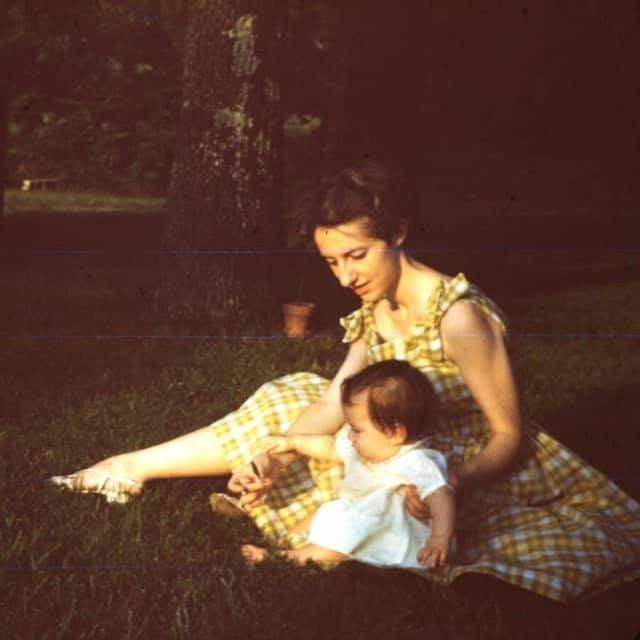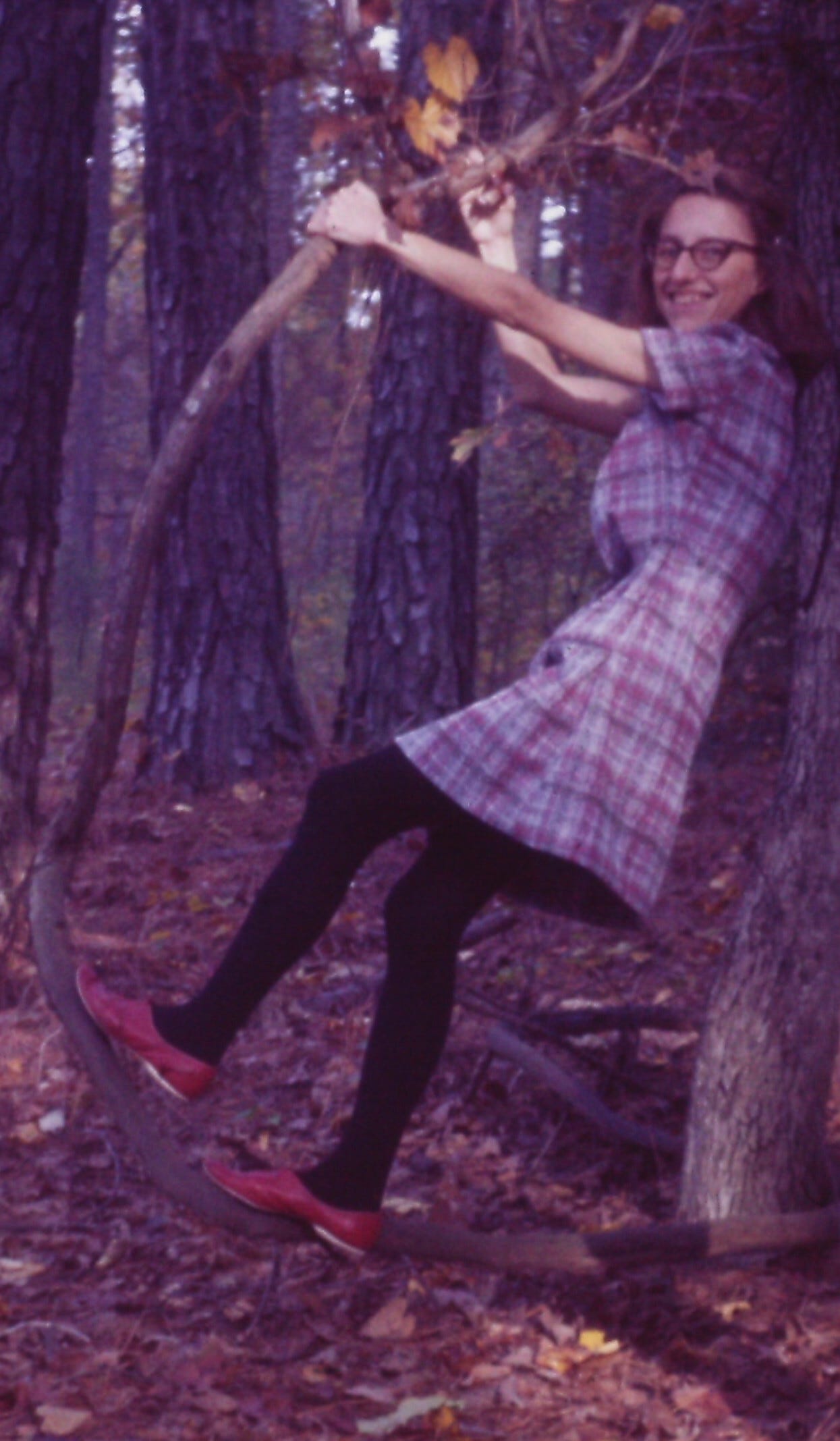The Appalachian Nature Poetry of P.E.B.C.
A guest spot illustrating a life steeped in nature's glory.
My grandmother, Pauline Edith Binkley Cheek, was a woman for all seasons. She was first a mother, a homemaker, and a wife. Second: she was a poet and a thinker. She raised three entirely individual and uniquely brilliant children, my mother being one of them, but she also viewed the world through the lens of someone in love with the natural world. She taught me to garden, to listen for birds, to spot the first buds of new life on the walnut trees in her yard, and to thank the trees we would pass by on our walks. She and my grandfather gifted me two apple trees at the time of my birth, both of which are still growing in my mother’s yard. Every year on my birthday she would take a photo of me on her old film camera standing rather awkwardly in front of the rhododendron bushes that always bloomed around late March. She gifted me with the memory of my growing with the branches of the bushes.
She was known around town as the woman who read while she walked. Standing less than five feet, my grandmother was the forest sprite of Western North Carolina. She flitted and fluttered from the library to the cow pastures, from Sunday school meetings to the blackberry bushes. As I have written on previously, it was the blue house on Tracy Lane where I first learned to love and appreciate the complexities of the natural world. My grandmother would walk through the woods with her basket of compost to the edge of the property to discard the egg shells and banana peels of the week. She would walk to the end of the lane to fetch the mail, she would take numerous detours throughout this secluded corner of the world she lived in to observe the plant life, to forage and pick, but never harm. Every year on Thanksgiving she would walk to the public library, knowing it would be closed, but expressing her thanks for the landscape of the Appalachian mountains. I return again and again to an entry in Dorothy Wordsworth’s 1802 Grasmere journals, as it rings clear to how I remember Pauline and could have been recorded in her own delicate script:
“Sunday, 31st.—I found a strawberry blossom in a rock. The little slender flower had more courage than the green leaves, for they were but half expanded and half grown, but the blossom was spread full out. I uprooted it rashly, and I felt as if I had been committing an outrage, so I planted it again. It will have but a stormy life of it, but let it live if it can”
There was never a time where the windowsill in the kitchen was without a plant cutting fighting hard for a second life. She would forage and lovingly pluck—the windowsill a family tree of African violets to validate her cultivation abilities. She loved to tell the story of her African violets. The original being her mother’s, a complex trip overseas with the upmost attention paid to transportation. She could take one leaf and create an entirely new life.
As I finish my thesis on the plant life in William Wordsworth’s poetry, I find myself anxiously looking for a proper expression of the acknowledgments that will proceed my research. I can not ever fully express the gratitude I have for both of my grandparents. Words would never suffice. My grandmother taught me to witness the glory of the natural world, and my grandfather gifted me with his love of literature. They both have imparted in me a desire to learn, to never lose touch with what I hold true and pure in my heart. Writing about these matters are never simple, and I will never finishing mourning the loss of Pauline, but I will never lose the parts of her that remain alive within me.
One thing my grandmother loved was writing. She transcribed the diaries and letters of my great grandparents, Olin T. Binkley and Pauline Edith, compiling them into a book dedicated to their love. Sometimes I will flip through the pages seeking a sense of calm, a validation that a love between two people so pure and complete can exist. I find a sense of grounding in my family history.
In composing the forward of my thesis I dug through the archives of my grandmother’s poetry. I wanted to include one of her nature poems. While I knew her words would resonate, I was surprised at how—as a scholar of romantic poetry—her verse sparked a new sense of the Appalachian Romantic. As a lifelong Appalachian, my grandmother saw the mountains and the land with such love and devotion. In 1988 she published Appalachian Scrapbook: An A-B-C of Growing up in the Mountains , an illustrated children’s book based upon an oral history project she conducted chronicling childhood in Appalachia.
For this entry on my Substack, I would like to propose a guest spot: The Appalachian Nature Poetry of P.E.B.C. I have included several of her poems, titled and dated as closely as I could discern from the archives.
For you darling Pauline, with all my love forever, Eleanor Gwyneth.
“A Day of Silence at High Pastures: AMERC” January 7, 2016
I will lift my eyes to the hills
And set my feet upon their ridges
Amid ferns and logs and carpeted rocks,
When curled leaves of rhododendrons provide protection against winter storms.
Unfurled, they draw strength from the warmth of the sun,
Evergreen to blossom forth come June.
When melting streams rush down to valleys below
And their singing waters join the dance of spring flowers
In celebration of sprouting seeds
Then my heart rejoices in being one at one with the All
Whose presence informs my being and delights my soul.
[After visit in the home of Marguerite Carson, London, Ky.] July, 1976
In the courtyard of a cabin
Reassembled from several homes
Shifting knots of recent strangers
Asked, exclaimed, and speculated
On the cabin’s ancient treasures—
Sampler, safe, and threadbare coverlet,
Puncheon bench and pewter plate,
Battling stick, broad trestle table,
Painted seat of a baby’s chair—
Till the cabin’s haunting silence
Hushed all sound but singing strains.
Then the past became the future
As the truth of tough-hewn timbers
Spoke through dulcimer and ballad,
And the people, yielding, listened.
“Autumn” 1979
When only a few rattling leaves remain
On the arms of the red oak tree
I might feel the chill in the winds of time
Tossing dreams growing brittle with age,
But feeling the warmth of an autumn breeze,
I grab up a rake and cry, “Marshmallow time”
For flames may destroy but can also create,
And a bite through charred crust yields the yummiest sweet.
So I look up at leaves left like hands on the oak:
They beckon to buds bearing dreams for next year.
“The Will for Life” Christmas, 1981
I will live my life on the mountainside,
Moving free, up and down, at my will.
On the heights I’ll dream dreams, catching visions of afar;
In the depths I will grope in dark of doubt.
And my yearning will be for my will to be one
With the One who created me.
I will tread the paths that were trod of old;
I will read what their makers wrote,
That I may discover the truth they divined,
And their wisdom and precepts note.
And my yearning will be one for my will to be one
With the One who created me.
I will trudge the streets where the suffering toil;
I will share in my kinsman’s plight,
That I may know the humility
That discerns what is kind and right.
And my yearning will be for my will to be one
With the One who created me.
I will enter the woods where the children play
And the elders their joy impart,
That I may affirm with creative love
An may walk with the pure in heart.
And my yearning will be for my will to be one
With the One who created me.
[Observation] January, 1983
The birds are out in droves today,
Precipitant as snow.
Their twitting, chipping whirring
Sets the heaver’s heart aglow.
Embowered by the cedar’s limb
Bowed down by weight of white,
They peck at ice-encrusted crumbs,
Renouncing normal fright.
Like children playing hopscotch,
Or acrobats on stilts,
They step stocatto in the snow
Like lines on crazy Quilts.
Their song belies their efforts;
Their plumage speaks of art.
Creation is in process;
Each bird’s a vital part.
“Beneath the Stars”
Shadows lengthen and fuse with the darkness of trees;
Dank odor of leaf mold is borne on the dew-heavy air.
Words lapse to thought waves through mellowing
stillness,
While insects’ cacaphonies swell.
Five lounging figures lose their hold on awareness,
And their souls become one with the night.
Forever…
The moment is over.
Farewell. A trek down the hill.
To those who remain at the cabin
Comes the quivering wail of an owl,
With its end in a high note of questioning:
“Must we long for what cannot be held?”
They know then the poignance of wistfulness,
the blending of awe with prayer.
[April 22, 1982]
Loneliness is
a dandelion head
when April’s Child
has launched her seeds
on a journey
into summer.
“Easter Afternoon”
Where last week only pinestraw lay,
Heavy and matted on winter’s drab floor,
Today a mass of living jewels
Patterns the carpet drawn forth by the sun.
From deep bedded roots hairy tendrils unfurl;
Persistently probing, they pierce the dense straw
Till lavender sepals, cream-tipped, veined in vermillion,
Burst their enveloping three-sectioned veils.
Impelled by their splendor we turn from the path;
In silence together we yield to the now.
From deep within bodies taut, fretted with doing,
There wells up a throbbing beyond mere sensation,
Till now becomes always, in vibrant communion,
The each yet intact but at one with the all.
Not effervescent like kites on the hill,
In jubilance soaring, then plummeting earthward,
But perennial, crescive; anew and renewing,
Like Easter hepaticas through woods mold reborn.
Something there is that goes on forever:
Though again we are buffeted, anxious, and busy,
A purple glory is with us still.
“Time Like a River” 1982
Time like a river incessantly flowing
Furrows the land, laying bare earth’s fertility;
Surges and swells with the force of its currents,
Tumultuous, insistent,
Passionate, impelling;
Crests, and subsiding runs quiet and deep;
Sloughs off debris brought by turbulent waters,
Harbors acceptance in unfathomed pools;
Diverts into new streams that may not be followed
But beckon the hesitant,
The defiant, the yearning;
Carves lifetimes on hands only pausing from labor
As well as on faces turned back or ahead;
Forms links, creates islands,
Lurks in treacherous shoals
With death for the weary,
The strong, the unwary;
Yet once again sparkles in rarified air
And bears, deep within, that which endures.






